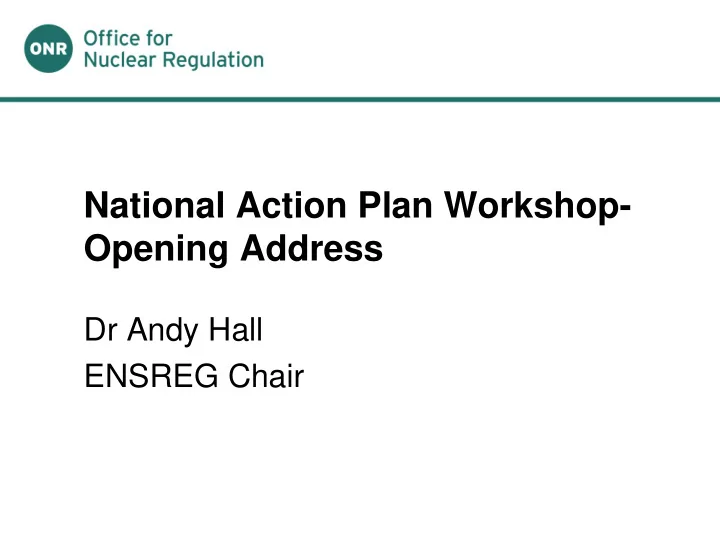

National Action Plan Workshop- Opening Address Dr Andy Hall ENSREG Chair
Why this workshop? A reminder Past severe nuclear accidents: • Three Mile Island (1979) Major core melt – research into phenomena • Chernobyl (1985) Safety culture – peer review • And then Fukushima Daiichi (2011) Design basis – Periodic Safety Reviews – regulatory independence
European Response to Fukushima Daiichi European Council asked for Stress Tests Scope: • Earthquakes, flooding and bad weather • Loss of key safety functions: electrical power and ultimate heat sink • Evaluation of safety margins – cliff-edge effects • Severe accident management, including off-site infrastructure disruption
National Action Plans Reviews were performed and improvements identified Expert teams of European nuclear regulators peer reviewed the national Stress Test Reports National Action Plans were developed to implement the improvements identified
Improvements Identified Engineering enhancements: • Mobile generators, pumps, vehicles, flooding protection Human and organizational performance • Independence of regulator • Peer review • Periodic Safety Reviews – responding to higher standards and emerging knowledge
Revised Nuclear Safety Directive EU published a revised Nuclear Safety Directive (NSD) in 2014 Major enhancements: • NPPs must avoid early radioactive releases that would require off-site emergency measures but with insufficient time to implement them, and large radioactive releases that would require protective measures that could not be limited in area or time.
Revised Nuclear Safety Directive Major enhancements: • States must ensure that arrangements are in place to allow for a first topical peer review to start in 2017, and for subsequent topical peer reviews to take place at least every six years thereafter
Why is this important? • Nuclear regulators must be neutral on whether there should be a nuclear contribution to a state’s electricity generation – their decisions must be objective and based on the science • Their duty is to ensure that if nuclear power is used, the legislated safety standards are met • The use of nuclear power is a political decision • Many states have decided to allow or encourage a contribution to electricity generation from nuclear power
Context for this Workshop • Security of supply continues to be a key issue in Europe and worldwide • The need for low carbon technologies to deliver our energy needs is driving an interest in nuclear power for many nations • Demands on ageing infrastructure provide new challenges to the nuclear sector • Substantial nuclear ambitions in both established and new nuclear nations
Implementation of the action plans remains relevant • Japanese industry is still recovering from the accident- still learning and sharing that learning • This opportunity for learning and improvement must be taken and implemented • The stress tests demonstrated that when reviewed against a challenging set of scenarios, further improvements were practicable • Peer review and collaborative action continues to underpin the international nuclear framework
Stress Tests show the benefits of international cooperation Action within Europe delivered swiftly in the aftermath of the accident, demonstrating; • collective and collaborative working across Europe is practicable and brings benefits; • peer review can drive closure of action plans and demonstrates regulators and industry can learn and improve; • ENSREG is committed to openness and transparency; and • the nuclear industry has a duty to continuous improvement - not just at fixed periods
New opportunities for international co-operation • Amended Nuclear Safety Directive- delivery of topical peer review • Convention on Nuclear Safety – the Vienna Declaration and its inclusion in the next peer review meeting • Joint Convention - consideration of the lessons from Fukushima on sites other than nuclear power plants • The on-going IAEA review of Safety Standards • Implementation of the reviewed WENRA safety reference levels • Implementation of new emergency arrangement requirements in the Basic Safety Standards Directive
Challenge to the workshop Continue to be robust and productive • Robustly test closure claims and evidence amongst peers • Actively seek & welcome constructive challenge Look forward • Think about our future collective and collaborative challenges • Consider the value of a lessons learned review • Consider what the learning is for the NSD topical peer process
Europe is demonstrating its collective commitment to continuous improvement and enhanced nuclear safety standards. It is our duty to ensure that this collaborative spirit and collective endeavour is applied to the implementation of the topical peer review required by the amended NSD.
Recommend
More recommend